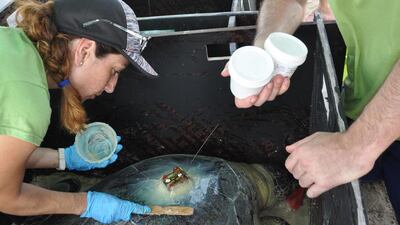ABU DHABI // New research on sea turtles in the Arabian Gulf, the world’s hottest sea, could help save the endangered reptiles.
With rising ocean temperatures, the Emirates Wildlife Society-World Wildlife Fund is researching the migration and genetics of hawksbill, loggerhead and green turtles to provide an insight into their behaviour in warm seas.
The Arabian Gulf experiences temperatures that scientists have predicted to be the norm for other seas in 20 years.
The EWS-WWF’s project involves scientists catching the turtles at sea, genetically testing them, tagging them, then observing their behaviour.
In the first phase of the project, they have found that turtles are diving to deeper parts of the Gulf during summer to seek refuge from the heat in the shallow waters that they usually inhabit.
“It’s an indication of how sea turtles can adapt to climate change, as you know the Gulf has extreme water temperatures,” said Jimena Rodrigues, project manager of the Marine Turtle Conservation project at the EWS-WWF.
“The research will help us understand the important nesting points of these green turtles, it will also shed light on their migratory patterns and the genetic information.”
As well as tagging turtles, the team is carrying out genetic tests to see how the heat affects the turtles.
“It’s quite a harsh environment so the animals that live here are really interesting and often unique because they need special adaptations to survive,” said Arabella Willing, marine biologist and chairwoman of the Emirates Natural History Group. “Turtles living here are key to research. The more we know about their adaption to heat, the better we can protect them.”
Ms Rodrigues said rising temperatures could affect the demographics of turtles by causing a gender imbalance.
“For example, usually the sex in turtles is determined by the temperature in the sand, so if temperatures continue to rise, we’ll end up with more females,” she said. “We recognise that there is a need for knowledge, and protection to avoid them from going extinct.”
The findings from the study will help guide not only regional decision-making by the Environment Agency-Abu Dhabi and the Ministry of Climate Change and Environment, but also guide global conservation efforts through the Marine Research Foundation.
All sea turtles are classified as threatened or vulnerable under the International Union for Conservation of Nature guidelines. There are numerous reasons behind their dwindling numbers, including destruction of their nesting sites and commercial fishing.
If turtles were to disappear from the seas, it could have a devastating effect on the ecosystem of the Gulf.
Already the numbers of jellyfish, which turtles feed upon, are on the rise as turtle numbers decline.
The second phase of the project will concentrate on green turtles, with tests in the UAE, Oman and Iran and other areas of the Gulf going on until 2019. The EWS-WWF will then suggest recommendations to the EAD and the government as to how they could best protect the turtles and marine life.
Currently, the UAE has enacted laws to help protect the sea turtles and their nesting sites.
_______________________________________________
Main threats to sea turtles
* Coastal and offshore developments creating obstacles for nesting females.
* City lights disorienting hatchlings from their nesting site to the sea, stranding them inland so they die from dehydration.
* Pollution and human waste causing fibropapillomatosis, also known as turtle cancer.
* Climate change causing rising water levels and the disappearance of beach nesting grounds for turtles.
* Increasing coral reef destruction leading to less habitats to support mature specimens.
* Boats and other sea vessels colliding with turtles, causing potentially lethal cracks in their shells.
Turtle facts
About 5,000 to 7,000 live in the region.
Up to 300 turtles nest on the UAE’s beaches every year.
The UAE enacted federal laws 23 and 24 in 1999 to give full protection to sea turtles in the UAE
Fishing methods and commercial exploitation is completely banned in the country
WWF estimates that eco-tourism of turtles could net Dh6 million per year, three times more than the revenue from commercial exploitation of turtles
Turtles in the UAE have been tracked to travel as far as east Asia
nalwasmi@thenational.ae

